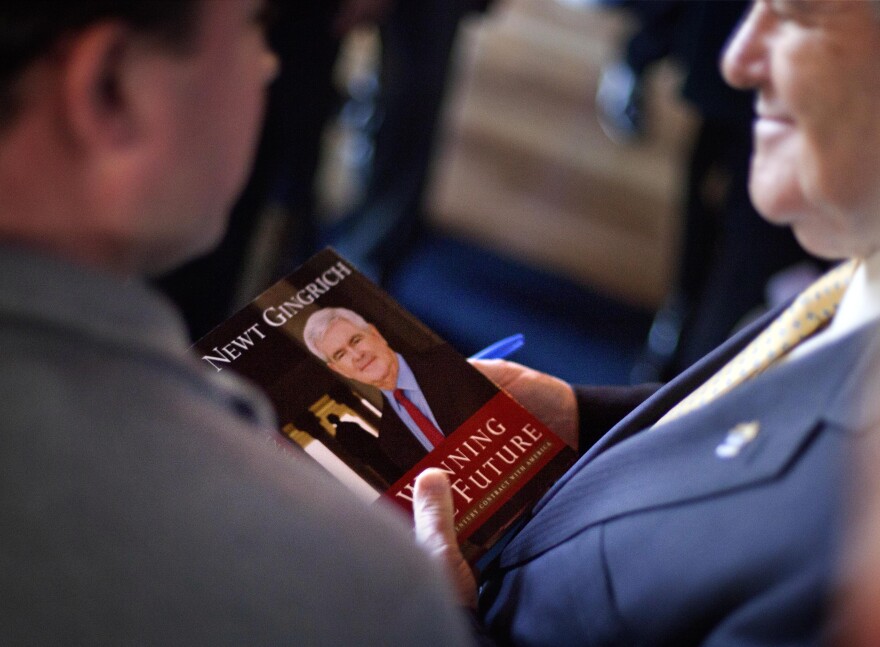There's a role reversal underway in political publishing. For years, conservative publishers have thrived as their readers flocked to buy books aimed directly at taking down the party in power. Now, with Republicans in control, they have to rethink their strategy. Left leaning publishers meanwhile are hoping to take advantage of the new political landscape.
Regnery books — which marks its 70th anniversary this year — is the grand old dame of conservative publishing. Dinesh d'Souza, Newt Gingrich, Ann Coulter and Laura Ingraham have all published with Regnery.
"For many years we would say what was bad for the country was good for Regnery," says Marji Ross, Regnery's president and publisher. "And by that we meant that when the opposition was in power that made our job a little easier and our books more successful."
When Donald Trump was elected President in November, some conservative book publishers were caught off guard. Rolf Zettersten, head of Center Street Books, the conservative division of Hachette Publishing, was expecting Hillary Clinton to win. His company was poised to publish several books critical of her presidency.
"We had to pivot and say: What are we going to do with these books that were going to be anti-Hillary?" Zettersten says. "Instead we developed new approaches that talked about the Trump agenda."
But Trump's presidency has exposed some deep divisions on the right, and conservative publishers have to reflect those differences.
"You have social conservatives, you have economic conservatives, you have people who are more libertarian," Ross says. And a Republican in the White House brings all of those divisions into sharper focus, she says — "because then all the different factions are lobbying for their version of what's right for the future."
If you are a polite voice in this market you really don't get listened to. We've certainly published our share of polite conservative books and they just don't sell as well.
There is one almost surefire route to success in conservative publishing — Zettersten says books by well-known personalities on Fox TV or talk radio, with a "take no prisoners" brand of politics often end up the best-seller list.
"If you are a polite voice in this market you really don't get listened to," Zettersten says. "We've certainly published our share of polite conservative books and they just don't sell as well."
Center Street already has new book on the New York Times best-seller list: It's called Trump's War: His Battle for America, written by conservative talk show host Michael Savage, who is not exactly known for politeness.
But provocateurs can go too far. Threshold Editions, the conservative wing of Simon & Schuster, canceled its contract with Milo Yiannopoulos after it decided remarks the right wing commentator made about pedophilia were too controversial. Of course, Yiannopoulos built his reputation on inflammatory rhetoric.
"I love flame throwers," says Marji Ross, who was offered the Yiannopoulos book but chose not publish it. Now Yiannopoulos is shopping it around again and it's been reported that Regnery might pick it up this time. Ross declined to confirm or deny that rumor. She says she has no problem with provocative political books, but not everyone agrees.
"Some people gravitate to certain radio talk show hosts who are really bombastic, and other people just can't deal with that," she says. "They want the more soft-spoken. And our job is to try to reach as broad of an audience as we can without watering down the essence of an author either in their message or in their style."
While conservative publishers are getting used to a new political reality, those on the left are realizing they've got a new advantage. Andrew Hsiao, an editor with Verso Books, is in that situation.
"I feel a bit sheepish saying this," he admits. "I am so deeply opposed to Trump — but let's face it — opposition is often good for political publishers. And our sales have already taken off. People feel hungry for criticism, analysis, knowledge and inspiration."
Verso Books has a history of opposition to the status quo in both the Republican and Democratic party. Hsiao says Verso comes out of the socialist tradition and publishes a wide range of progressive thinking. He sees their mission as two-fold: To open people's minds to new ways of thinking and to support the resistance.
"In a way, movements call up the literature that they need," Hsiao says. "And our fortunes in the last decade have exploded. I think it's unquestionably because of a new movement, especially among young people, to look for more radical alternatives, radical solutions to American problems."
Hsiao says the country is engaged in an intense political throw-down which he thinks is better than complacency. And publishers — on the right and the left — are in the middle of the fray.
Copyright 2021 NPR. To see more, visit https://www.npr.org. 9(MDAwMzY5MzE4MDEzMTE3ODg5NDA4ZjRiNg004))



